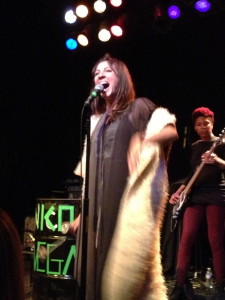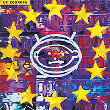Nico Vega and Oh No Fiasco Deliver Hard-Hitting Rock at Nashville’s Exit/In
August 25, 2013
Nashville’s the Exit/In, a classic yet almost easy to miss venue, recently played host to Los Angeles band Nico Vega, an up-and-coming powerhouse of a band known for their mix of musical elegance and gritty energy. The opening band, Oh No Fiasco, with whom Nico Vega share a label, combine alternative rock roots with a sometimes cutesy punk flair.
Oh No Fiasco opens, immediately setting the bar for showmanship. The band’s lead singer, Lindsey Stamey, is a complete fireball on stage, melting faces right off the crowd as the band plows full force through the first song of their set. The stage is completely electric as the five members of the band bounce, dance, and enjoy what they obviously love to do. Theatrics are integral to the band’s performance, exemplified in moments where the band’s drummer spits water onto the drums while playing, showering himself and the stage, or when the keyboardist places a small keyboard on another member’s feet and plays through the remainder of the song.
Oh No Fiasco ends their unfortunately short set with Stamey singing from the balcony seating of the venue. The group is an obvious crowd-pleaser as fans on the floor show their affection and admiration as she swaggers on through.
Following Oh No Fiasco, Nico Vega takes the stage. Lead singer Aja Volkman approaches the mic, looping vocals in harmony as the band forms onstage. The performance is very personal, humble even. For a band that’s known for exemplifying a rebel spirit, they’re all terribly mild-mannered.
Not to say they can’t kick out a jam like no other.
Volkman’s vocals are high-flying, soulful, and smooth as silk one minute, then growling and full of all the raw passion you’d expect from someone who stands on a steel barrel and sings while beating the sides like a drum. Her showmanship onstage is energetic, swaying and dancing from side to side, hands raised or slapping cymbals of the band’s drum set. Her passion and feeling for the music itself is soul-touching on a real level.
Not surprising coming from a band that considers itself more a way of life than just an expression of musical talent.
The set features songs from the band’s self-titled album of 2009 and their recently released EP, Fury Oh Fury. The band opens with “Lead To Light,” leading into “Fury Oh Fury” and “Lightning,” all songs from their current EP.
In the midst of the fury and passion comes the song “Wooden Dolls,” a slow, expressive tune about the unity of people and also the barriers we create, all sung from atop the aforementioned steel barrel onstage. Volkman’s sincerity is clearly visible in her presentation of the lyrics. It’s pleading, hopeful, and beautiful in every way.
One of the band’s more easily recognizable songs, “Gravity” begins slow with floating guitar and ethereal vocalization, but suddenly exploding into life as the song picks up pace, delivering hammering drum beats alongside Volkman’s vocal power as she sings about the oppression of conformity.
The set closes with the band’s powerhouse anthem: “Beast.” Featured in the trailer for the video game Bioshock Infinite and also a trailer for film Pacific Rim, this song alone is at least partly responsible for the band’s recent success, and it’s very clear why.
The song begins with a pounding, militant drum and heavily distorted guitar. The guys and girls of Nico Vega know what this song means for listeners, fan or otherwise, and they deliver on every level. It’s everything the band is about, rejection of oppression and a demand for unity amongst all people against the “beast of America.” That passion is palpable, almost a lusting passion for defiance against whatever it is that holds us down and forces its will on us.
It’s the perfect note to end on for a band with their level of conviction and proof that Nico Vega is everything that’s still right with rock and roll today. –Jordan D. Frye, Contributing Editor
Unsettling Combinations: Zooropa Retrospective (part one)
August 8, 2013
The time that’s passed since the 1990s requires us to look at that period of U2 from a different angle. As the world of U2 fans celebrates the 20th anniversary of Zooropa this summer, we turned to our webzine intern and “intermedia” co-editor Jordan Frye to get his take on the record. With only a year longer on the planet than the album, Frye likes U2 but does not love U2 like we do and approached the band for this review in a way that may seem unfamiliar to some of us, a sort of outsider perspective. We hope you enjoy what he discovered. –Andrew Smith, Editor
U2’s Zooropa is a point of contention for many U2 fans. Even twenty years after the album’s release, the issue still stands: is Zooropa any good? If so, where does it fit in with the rest of U2’s discography?
In the context of following what is generally agreed upon as the band’s most successful and creative period, The Joshua Tree and Achtung Baby in particular, Zooropa is a strange departure from the band’s familiar style. It’s an odd career move, but not unheard of. Many bands reach the peak of their fame and follow up with an album consisting largely of experimental tracks. For the die-hard U2 fan, it’s strange for some, yet one of the best for others.
Even though I am not a die-hard U2 fan and even though we know that writing songs about societal issues is nothing new for U2, the unsettling social aspects of the record stick with you.
From an outside perspective, Zooropa is a truly interesting listening experience. It’s strange at times. There are little moments where the types of sounds used for a song don’t seem to go together. A tambourine might break in during a moment of grungy, groaning guitar, such as in “Numb.” At other times, the sound can be absolutely beautiful, soaring, and full of texture.
The album carries with it an underlying tone of darkness. Not necessarily in content, but the sound itself is dark, moody, and primal. The title track “Zooropa” begins with chanting, eerie yet beautiful, finally breaking into floating guitar and Bono’s voice, swimming in modulated distortion.
There’s a tension between U2’s tendency toward positive sounds, even during moments of intensity, and the draw toward the darker side. Unsettling combinations of sounds that don’t belong together: much of it seems intentional.
“Babyface” combines a more typical U2 sound with a tinkling sort of childish tune in the backdrop. The content seems to apply to a child, arguably Bono’s as his first two children would have been only a few years old at this point in the band’s career. This combination of sounds continues throughout much of the album.
There’s an obvious message in the album as a whole. It’s difficult to grasp as one whole idea, but it sounds like an indictment of modern life. “Daddy’s Gonna Pay For Your Crashed Car,” “Zooropa,” and “The Wanderer” all deal with images of the corrupt nature of modern society and the issues therein.
Some tracks really benefit from the experimental edge. “Some Days Are Better Than Others” combines simple lyricism with a good beat and twangy, guitar-driven chorus. Other’s hardly feature it at all, such as “The First Time,” bringing out the more familiar slow ballad side of U2. All the same, it’s a gorgeous song, full of religious symbolism and touching images of true love in all its forms.
Zooropa is, simply put, difficult to really pin down. It’s weird. It has its moments where the only question is ‘Why would they do that?’ Other moments leave hairs standing up on the back of your neck. Compared to the canonical classics of U2 discography, it might not quite measure up, but it’s definitely no mistake on the band’s part. It’s an interesting look at a different U2, and maybe, it helped them make it through their height-of-fame phase and into musical adulthood with little consequence.
If anything, an album that fades out with a guest appearance by Johnny Cash himself has something going for it. –Jordan Frye, Contributing Editor






Recent Comments